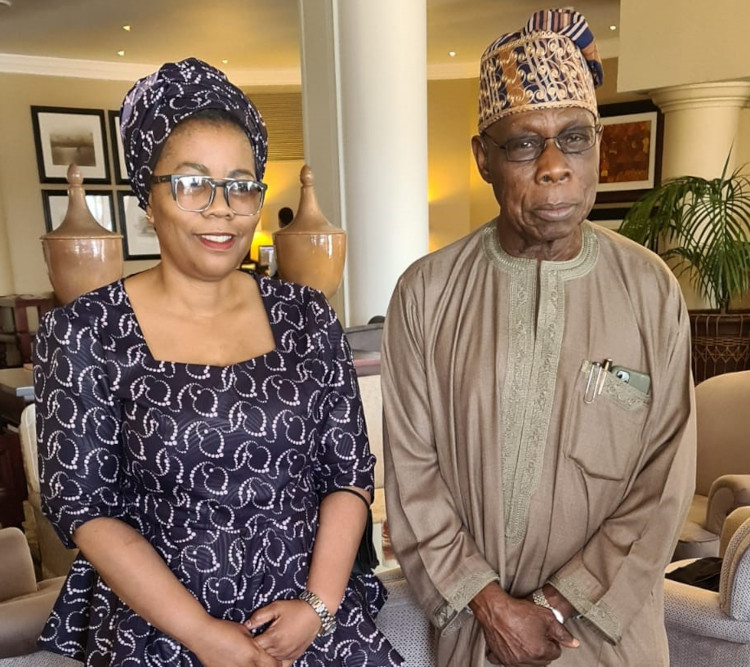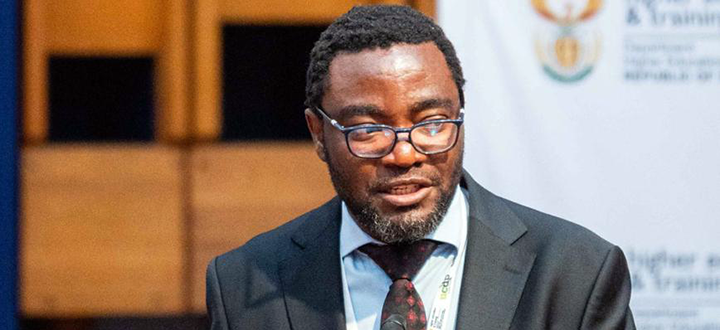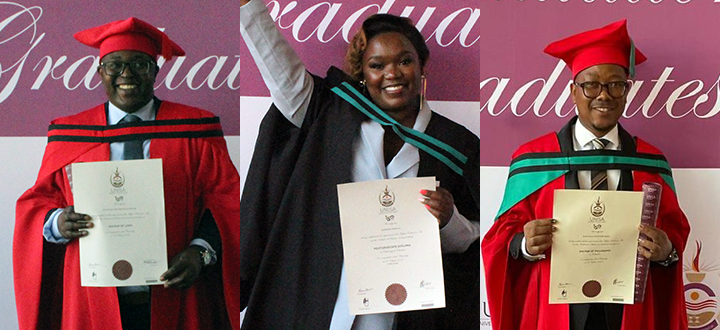News & Media
Unisa Vice-Chancellor meets with former Nigerian President
On 21 November, a University of South Africa (Unisa) delegation led by Principal and Vice-Chancellor (VC), Professor Puleng LenkaBula, had a breakfast meeting with His Excellency, former President of Nigeria, Olusegun Obasanjo, in Durban to discuss wide-ranging ideas on the marketability of Unisa to the rest of the continent and establishing a footprint through enrolling a sizeable cohort of master’s and doctoral students across Africa. Also discussed at the meeting was developing skills in the area of multilateral institutions.

Unisa Principal and Vice-Chancellor, Professor Puleng LenkaBula, and former President of Nigeria, His Excellency Olusegun Obasanjo
The Unisa delegation, including the Chairperson of the Academic Committee of Council, Dr Wiseman Magasela, the executive deans, and staff members from the Office of the Vice-Chancellor and the KZN Region, had a great opportunity to participate in discussions with the former President of Nigeria who is also the Chairperson of the Intra-African Trade Fair Council. They exchanged views on how to strengthen and establish partnerships and collaborations with other African universities and attract more students from the African continent to study at Unisa.
The VC said that this was a great opportunity for the university to harness its representation on multi-lateral international bodies as well South Africa’s representation on these bodies. She posed a question on how to make this endeavour work for mutual benefit for the university and the continent. She emphasised the need for the university to market itself across the continent with a message to make the university more attractive to African students and scholars.
Magasela said: ‘We must work on ideas to realise an integrated Africa through partnerships with other African universities and student exchange in the fields in which the university has expertise, such as peace-keeping efforts, agricultural science and education.” He further said the South African seaboard has several areas which are not fully explored, and there is a need for establishing maritime studies by the university. He also noted that economic development zones could be established to harness economic growth in rural coastal areas, especially in the greater KZN South Coast, up to Port St Johns in the Eastern Cape. He said there are great opportunities there for the university to explore and as a member of Council he fully supports ideas to practically implement actions aimed at bringing those ideas to life.
The university’s delegation observed that all engagements had been fruitful and there was room to exploit many opportunities which came as a result of the university’s participation in the Intra-Africa Trade Fair, which had a number of side-engagements such as the gala dinner hosted by the VC at which the KZN government was represented by MEC for Economic Development, Tourism and Environmental Affairs, Ravi Pillay, who pledged the provincial government’s support for Unisa in educating young people of the province.
The former President of Nigeria also pledged his support for Unisa to establish relations with African universities, more especially because he was a good friend of the university’s Chancellor, former President Dr Thabo Mbeki. The VC said that the university was eager to extend its work to the rest of the continent and the world, thus truly marching towards becoming “the African university shaping futures in the service of humanity”. In closing, the VC expressed her sincere appreciation for the great teamwork being put together by all Unisa’s colleges. She encouraged more collaborations amongst colleges and pleaded with colleges to break down the walls and not to work in silos.
Taking this further, Professor Edith Phaswana, from the Thabo Mbeki African School of Public & International Affairs, spoke about the need for the College of Education and College of Human Sciences to work with her school to intensify partnerships in developing teaching and learning in strategic languages such as Arabic, Mandarin, Portuguese, and KiSwahili.
* By Siyabonga Seme, Communications Manager: Unisa KZN Region
Publish date: 2021-11-21 00:00:00.0


 Driving entrepreneurship for sustainability
Driving entrepreneurship for sustainability
 Unisa Chancellor's Golf Challenge drives hope and access to education
Unisa Chancellor's Golf Challenge drives hope and access to education
 Unisa equips African women to lead as equals
Unisa equips African women to lead as equals
 New graduates will create a better world
New graduates will create a better world
 Unisans continue to make a major impact on and off the pitch
Unisans continue to make a major impact on and off the pitch